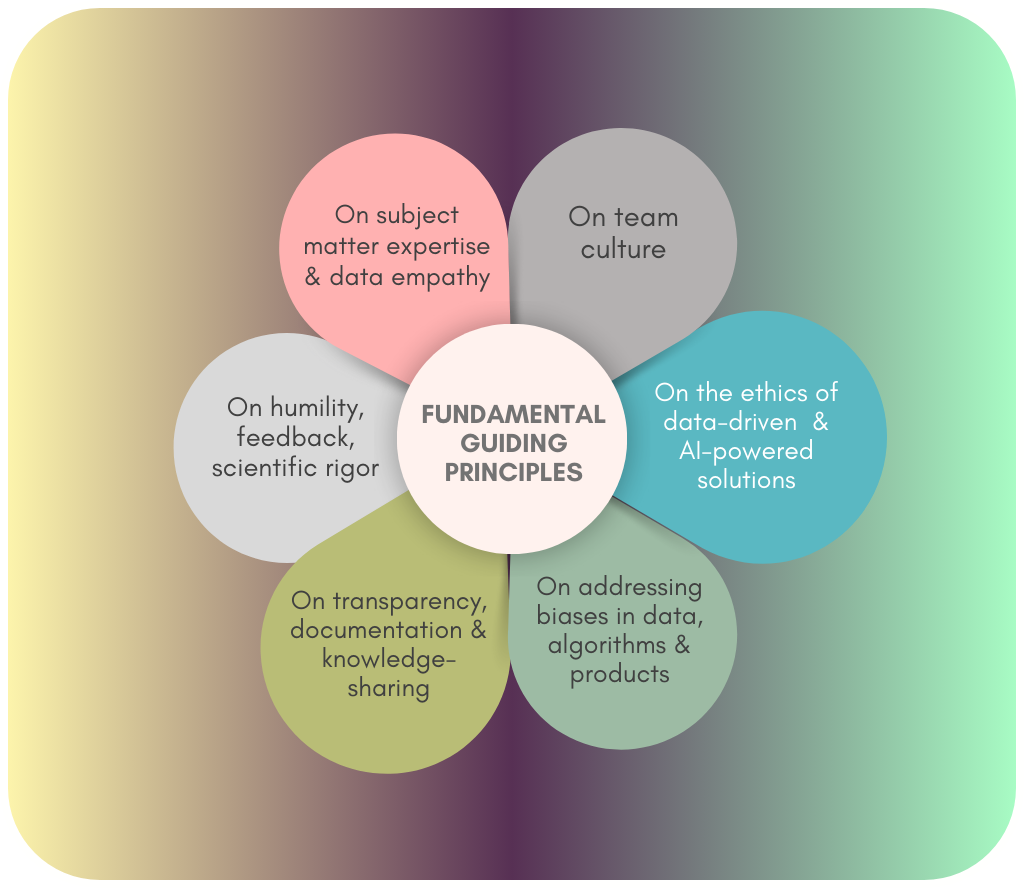Six fundamental principles that guide my approach to developing robust data science solutions via effective leadership of data science teams:
Team Culture:
A team’s culture is the dynamic environment that shapes and is shaped by members of the team; it informs the collective identity individual team members bring to discussions, presentations, and forums across the organization & nurturing it is a central responsibility of team leads.
Developing an environment of psychological safety for every member of a team is foundational to a healthy culture.
Sexism, racism, homophobia, transphobia, xenophobia, antisemitism, islamophobia, casteism, and ableism must not be tolerated in overt or covert ways.
Appropriate restorative mechanisms must be established in collaboration with the organizational function responsible for company-wide People & Culture to ensure adequate, empathetic, and just steps are enabled
Cultivating a data-centric team culture, one where we lead with deep curiosity for the data underlying each layer in a product’s development life cycle is necessary for the curation of ethical, unbiased products; enabled via close collaborations with subject matter experts across teams.
The quality of rest and support that our team members get is directly proportional to the quality of our work.
Transparency, Documentation, Knowledge sharing
Comprehensively-reviewed, easily accessible, and reader-centric documentation is key to the success, vitality, & progress of individuals, teams, and their projects.
Familiarity and agility with key team and org-level documentation must be cultivated such that; team members are proficient in identifying the location of information that they need, when they need it. This accessibility allows for vibrancy in discussions, thoroughness in research, and greater fidelity in solutions.
Development of an Information Architecture capturing the breadth and depth of work the team engages in, including templates, standard examples, clear terms of engagement & review, sign-off criteria’s are necessary for transparency and reproducibility of our work, and fundamental to effective knowledge-sharing.
Time for drafting, reviewing, and responding must be accounted for in the project and associated capacity planning.
Its important that our work fits and gets to interact with the broader, ever-evolving realm of research and development across diverse fields. Sharing our work and findings through white papers, conference presentations, and journal articles facilitates future innovation and faster integration into practical solutions.
Data Empathy, Subject Matter Expertise
Data empathy, or a comprehensive and wholistic understanding of our data is important to cultivate within teams and and is effectively achieved via deep and meaningful collaborations with subject matter experts across social, scientific, technical, and clinical fields across a range of actions including onboarding, documentation review & sign-off, trainings etc.
Data empathy is cultivated with a robust understanding of the provenance, lineage, and domain of the data, its design, management, and maintenance, security and governance mechanisms, and maintained via regularly reviewed, updated, and disseminated documentation.
Data empathy can be sustainably developed within teams via close and thoughtful collaborations with subject matter experts.
Addressing Biases
Societal structures around us bear the marks of inequities shaped by biased perspectives. Bias is a characteristic of the human thought process, and embedded in the data & technologies we interact with. Confronting this gloomy reality is a necessary step in the commitment to developing ethical solutions.
As we utilize different data sources, foundational models, leverage existing research, and interact with data-, AI- powered products it is critical to develop an intuition for identifying and calling attention to a variety of biases and where in the lifecycle of a project we might encounter them.
Crafting Risk of Bias Assessment Frameworks collaboratively with social, technical, scientific, and domain experts: a comprehensive account of biases we anticipate in (1) the data, (2) the algorithms, and (3) the end product and how we anticipate to address them.
Humility, Feedback, & Scientific Rigor
Regularly assess the alignment of our solutions with the overarching goals.
Successful data-driven solutions are built upon a range of peer-reviewed and real-world knowledge which must be ethically interacted with and diligently cited and acknowledged.
Our expertise in various fields should not hinder our ability to solicit, receive, and interact with feedback from our colleagues and subject matter experts.
A thorough account of limitations of our methods and experiments allows for the transparent and robust implementation and use of our solutions/findings, and clearly defines opportunity for future development and collaboration.
Development of effective feedback channels and training our teams in their engagement is key to developing lasting, rigorous solutions.
Documentation and code review methods, standards, and expectations must be set, monitored, and regularly reviewed and disseminated.
Ethical Solutions:
Technology built atop the exploitation, subjugation, or devastation of peoples, our ecology and the living beings it sustains is fundamentally immoral and should not be pursued.
Avoiding the reality of our impact runs anti-parallel to sustainable innovation. As a technology, science, and data practitioner I strive to practice radical awareness of my footprint /wholistic impact in this world and the footprint of solutions I pose.
Treating data security and data management transparency as foundational, non-negotiable components of our product development life cycles is cornerstone.
Robust human review and and continuous validation is necessary after deployment to ensure maintenance of high quality, ethical solutions.
